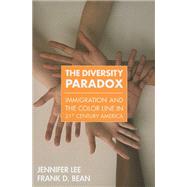"Using an impressive arsenal of quantitative and qualitative data, Jennifer Lee and Frank Bean offer an authoritative analysis of the color line in American society, revealing a remarkable paradox at the heart of contemporary intergroup relations. Although immigration has dramatically increased the share of Asians and Latinos, and patterns of intermarriage and self-identification reveal greater racial and ethnic mixing than ever before, one divide continues to stand out: that between African Americans and everyone else. Their careful analysis challenges both glib assertions of a post-racial order as well as pronouncements about the immutability of America's racial categories. Racial meanings are clearly changing, but whether they will change enough to overcome the age-old `American Dilemma' remains to be seen."-Douglas S. Massey, Henry G. Bryant Professor of Sociology and Public Affairs, the Woodrow Wilson School
"The study of multiracial identification is both timely and theoretically significant. Jennifer Lee and Frank Bean combine their distinct sensibility and nuanced sociological imagination with rigorous application of qualitative and quantitative methodologies to make a seminal contribution to research on interracial dynamics that will forever challenge our understanding of race in twenty-first century America."-Min Zhou, professor of sociology and Asian American studies, UCLA
"Jennifer Lee and Frank D. Bean have produced a penetrating analysis of how the new immigration and a rapidly growing multiracial population have complicated America's racial and ethnic hierarchies. Through a combination of demographic analysis and in-depth interviews, they reveal a remarkable blurring of racialized boundaries for some groups in many places, while they also detect the stubborn persistence of a color line. The Diversity Paradox challenges old notions of race and ethnicity and brings unusual clarity to understanding a changing America."-Edward Telles, professor of sociology, Princeton University
"Jennifer Lee and Frank Bean's comprehensive, data-filled, and insightful analysis adds considerably to our understanding of multiracial life in America. The Diversity Paradox is a very welcome and greatly needed book, for the study of multiracials will be high on immigration, race, and ethnicity research agendas in the coming years. The book's report about the country's ethnoracial present and future should be of special interest to students. They will be spending their adult lives in an America marked by the paradoxical treatment of diverse nonwhite people about which Lee and Bean write."-Herbert J. Gans, Robert S. Lynd Professor Emeritus of Sociology, Columbia University
African Americans grappled with Jim Crow segregation until it was legally overturned in the 1960s. In subsequent decades, the country witnessed a new wave of immigration from Asia and Latin America, forever changing the face of American society and making it more racially diverse than ever before. In The Diversity Paradox, authors Jennifer Lee and Frank D. Bean take these two poles of American collective identity---the legacy of slavery and immigration---and ask if today's immigrants are destined to become racialized minorities akin to African Americans or if their incorporation into U.S. society will more closely resemble that of their European predecessors. They also tackle the vexing question of whether America's new racial diversity is helping to erode the tenacious black/white color line.
The Diversity paradox uses population-based analyses and in-depth interviews to examine patterns of intermarriage and multiracial identification among Asians, Latinos, and African Americans. Lee and Bean analyze where the color line---and the economic and social advantage it demarcates---is drawn today and on what side these new arrivals fall. They show that Asians and Latinos with mixed ancestry are not constrained by strict racial categories. Racial status often shifts according to situation. Individuals can choose to identify along ethnic lines or as white, and their decisions are rarely questioned by outsiders or institutins. These groups also intermarry at higher rates, which is viewed as part of the process of becoming "American" and a form of upward soical mobility. African Americans, in contrast, intermarry at significantly lower rates than Asians and Latinos. Further, multiracial blacks oftern choose not to identify as such and are typically perceived as being black only, under-scoring the stigma attached to being African American and the entrenchment of the "one-drop" rule. Asians and Lations are successfully disengaging their national origins from the concept of race---like European immigrants before them---and these patterns are most evident in racially diverse parts of the country.
For the first time, in 2000, the U.S. Census enabled multiracial Americans to identify themselves as belonging to more than one race. Nine years later, multiracial Barack Obama was sworn in as the 44th President of the United States. For many, these events give credibility to the claim that the death Knell has been sounded for institutionalized racial exclusion. The Diversity Paradox is an extensive and eloquent examination of how contemporary immigration and the country's new diversity are redefining the boundaries of race. The book also lays bare the pwerful reality that as the old black/white color line fades a new one may well be emerging---with many African Americans still on the other side.








